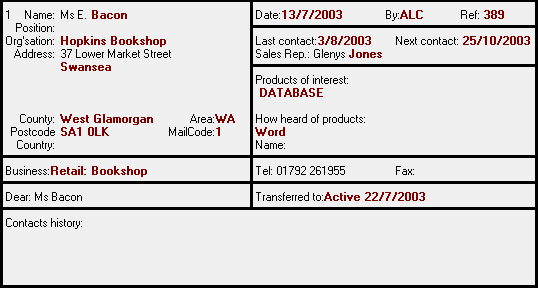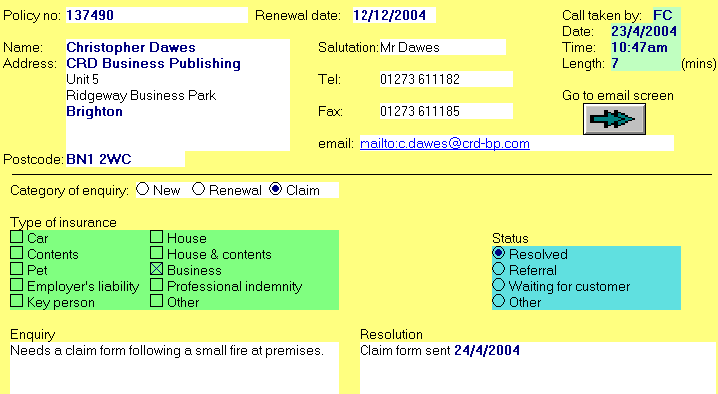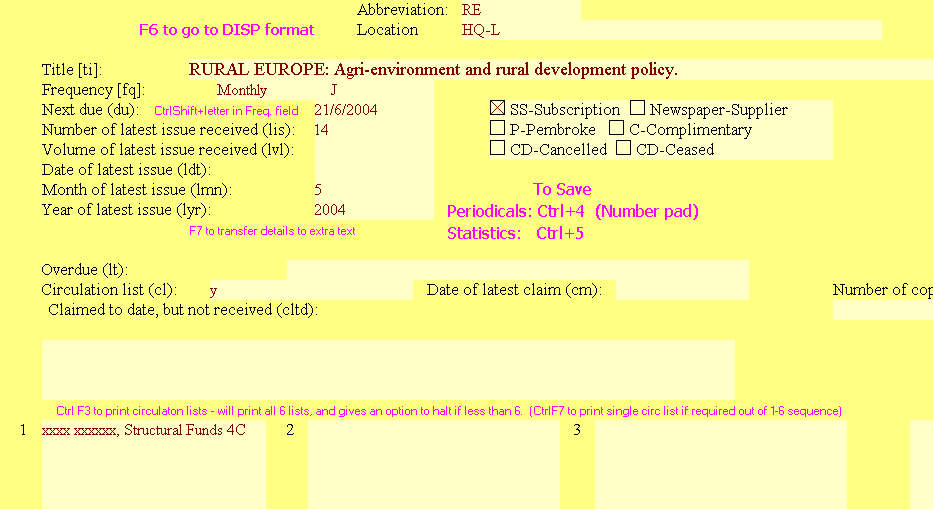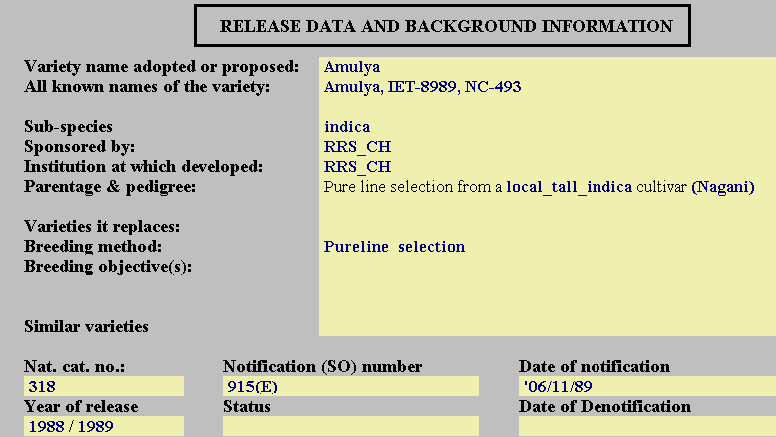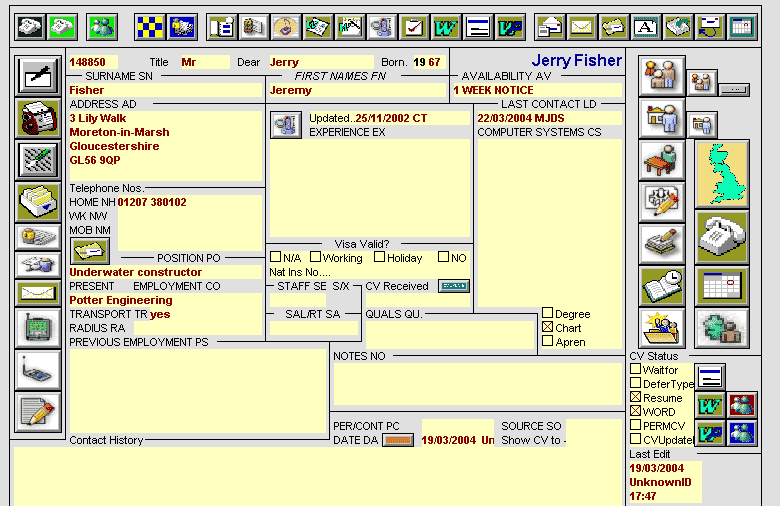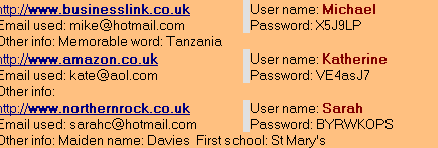Uses of Cardbox
There are as many different uses of Cardbox as there are businesses. There is no way that we can illustrate all of the possible applications of Cardbox, so we'll concentrate on some of the commonest ones.
Customer relationship management
At the simplest level, Cardbox can be used to maintain a database of names and addresses. Mailing labels can then be created for mail shots. However, many of our users have built more sophisticated systems using Cardbox. We've heard of databases of almost a million records, with customers categorised by their fields of interest and their assigned sales staff. |
Here, on a less epic scale, is the sample Contacts database we distribute with Cardbox. |
Invoices
Cardbox is not an accountancy package. Nevertheless, since most of what gets classed as "accountancy" is straightforward database management, and Cardbox is such a flexible database, people often use Cardbox for invoicing and account management. We use it ourselves. There are two main ways that you can use Cardbox for things like invoices. One is to keep all the necessary information in the Cardbox database and then use mail-merging to generate the actual invoice. |
Here is another way, where the invoice itself is stored in a separate Word file and Cardbox simply does all the indexing and summarising. |
Time-critical situations
Because its search engine is so fast, Cardbox is used for telephone help lines and support centres. Cardbox is also used at a chemical plant: when an accident occurs, Cardbox is used to identify the type of accident, to look up the first measures to control the situation, which people must be contacted, the severity of the alert and the probable risks. Other time-critical situations include a poisons information bureau
and airline safety management. |
|
Membership databases
Many clubs, societies and professional associations use Cardbox to
record their members' details. |
Case study: how the Galpin Society uses Cardbox for its membership system.
|
Museums
Museums are extensive users of Cardbox. They use it to maintain databases of their acquisitions and catalogues as well as running their administration. Museums are increasingly building online catalogues of their collections
and using Cardbox to make these accessible across the Internet. |
Case study: how museums such as the Thackray Medical Museum and the Rotterdam Historical Museum use Cardbox.
|
Libraries
At the simplest level libraries use Cardbox to maintain a catalogue of their books. But Cardbox is also being used for:
|
Here is an illustration of periodicals management. |
Bibliographies
One of the most irritating tasks that any academic researcher faces is maintaining a list of references. It’s irritating because it’s a distraction from the main job but it still has to be done right. There is nothing that terrifies a Ph.D student more than finding an absolutely crucial quotation in the finished thesis but having no idea at all where it came from!
|
Cardbox is so flexible that you can create a single database for all your references, books and articles; divide them into primary and secondary sources; and then create an alphabetical list that can then be read into a word processing package and edited further. |
Abstracts
Researchers also use Cardbox to keep databases of abstracts. There
are two strategies: one is to have a separate field for keywords, and
the other is to mark and index the keywords within the body of the abstract
itself. Do whichever seems more convenient to you: the picture we show
here is of the first approach. |
Quite a few researchers download abstracts from online databases such as Medline. They can combine abstracts from various sources (including ones they have typed or scanned themselves). They can also annotate the abstracts by adding extra Cardbox fields for comments or classification. |
Scientific research
Numerous research agencies use Cardbox. Academics are experts in their own discipline but they don't want to be computer experts. With Cardbox it’s easy for them to set up databases that can be searched by other academics who are active in the same field, without having to get any computer departments involved. |
Here is an illustration of how Bangor University used Cardbox when undertaking some research into Indian crop cultivars. |
Education
Once a school starts using Cardbox there is no stopping it. School
reports are an obvious example, but in fact Cardbox can be used for
many of the administrative tasks that any large institution needs, from
building maintentance to telephone records. |
Case study: how an Australian company, Winifred West Schools, uses Cardbox extensively in the running of three educational facilities.
|
Photographs
Digital photography generates an overwhelming mass of images. Scanning existing photographs produces even more. Cardbox is perfect for cataloguing and storing these images. It can
extract basic information (such as date and time) automatically from
each picture, and you can add indexed fields of your own to make it
easy to find the image you want. |
The sample databases we distribute with Cardbox include a photographic database that you can use or modify to suit your requirements. We also have a Knowledge Base article that illustrates a complete photographic archive in Cardbox,with the database stored on your computer and the original digital images stored securely in Amazon's S3 online storage system. |
Actors and casting
Ten thousand actors, each with photograph and CV. This is a casting director's dream - but also a nightmare: how to find the ones you want? Cardbox made it easy to search according to age, appearance and skill, print contact sheets of photographs, and locate the relevant agents. |
Here is an illustration of how it all worked. |
Documents
Cardbox can save you from drowning in paper. Set up a "daybook" database and scan every incoming document into it. Annotate each record with categories and keywords, and you will be able to search for whatever you want, whenever you want, and read the document straight off the screen. Most of the documents can be thrown away once you've scanned them. When you come across one you need to keep for legal reasons, put it in a box file, filed simply under its Cardbox record number. The closer your office gets to a "scan and shred" policy for documents, the happier it will be.
|
Legal firms also use Cardbox to maintain their case records, libraries and registers of wills, codicils and deeds. Travelling executives let their PAs scan all their incoming correspondence so that they can access it from a laptop anywhere in the world. |
Recruitment
Many recruitment agencies use Cardbox. It can store a candidate's details, CV, qualifications and references, plus a complete history of every conversation, interview and job offer. |
Here is an illustration of a really sophisticated recruitment application, with special-purpose pushbuttons for every conceivable action. Cardbox can be as simple or as complex as you like. You can start simply and build up your database designs over time, as your needs evolve. |
Passwords
People who live online rapidly realise that they are accumulating an uncontrollable number of different identities for different sites and services. Unless you use the same user name and password for everything (a very dangerous thing to do from the point of view of security) you end up with total chaos. A simple Cardbox database with just a handful of fields will solve the problem. |
How to protect the password database itself? Cardbox has built-in encryption facilities. You'll still have to choose and remember an encryption key, but one key is easier to remember than a hundred passwords. |
Some other business uses of Cardbox
| Advertisers’ details Aerial images Alumni Architectural references Artists Assets registers Building maintenance records Burial registers Calibration records Car pass management Careers information Catalogues Civil engineering data Classic cars Client callouts Competitor research Computer equipment register Computer maintenance records Concert programmes Desiderata lists Disaster reduction training Drawing records Economic development data Faults reporting Financial services tracking Fleet records Glossaries Health and safety data Heirlooms Hire records Hotel guest cards |
Housing benefit case management Information databases Inventories Job sheets Legislation databases Local history records Local information Local business support databases Logging hardware and software faults Logistics Mailing lists Maintenance records Manufacturing data Map collections Meetings data Motorway structures Music Nature conservation information Newspaper archives Object catalogues Order tracking Passenger lists Patent databases Personnel management Photographs Pictures Planning decisions analysis Plant databases Population data Prize winners Production analysis records |
Project management Property database Property management Purchase ordering system Quality control Questionnaire analysis References Regimental associations Safety checks data Sales control and forecasting Service records Ships information Skills database Slides and negatives Song files Sports club player statistics Staff phone directory Statistics Student registers Subscription records Supplier indexes Telephone directories Telephone information for the disabled Theses collection Trade union membership Train journeys Training records Translators' data Truck specifications Vacancy database Vehicle registrations Vocabulary database |
